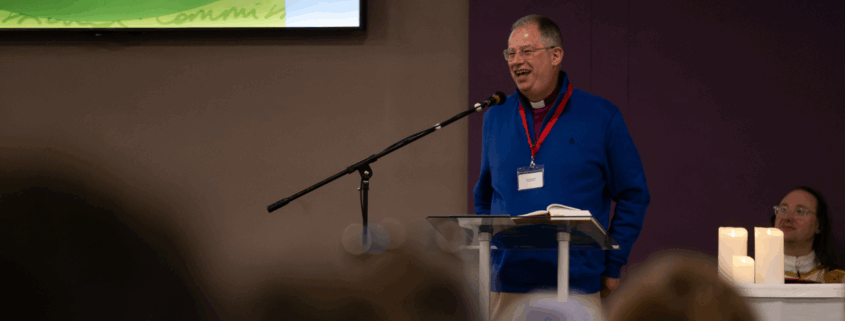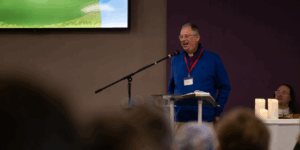The Household of Cornelius and the Conversion of Peter
In Caesarea there was a man named Cornelius, a centurion of the Italian cohort as it was called.
So begins the third in this sequence of stories of conversion. Again the Holy Spirit is at work beyond and outside the Christian community. Again the Holy Spirit is challenging and stretching the early followers of Jesus. This time we have a different minister. Philip the deacon was followed by Ananias the presbyter. Now we have Peter apostle and overseer, the leader of the church whose name will be forever linked with the Bishopric of Rome. There are many kinds of ministry and service in Acts as there are in this room.
He was a devout man who feared God, with all his household; he gave alms generously to the people and prayed constantly to God.
Cornelius and his household are ready to receive Christ. As many commentators have pointed out, the change and conversion in this story is not primarily the conversion of Cornelius. James Dunn in his commentary titles this section of Acts: The conversion of Peter and the Reception of Cornelius.
The Holy Spirit is at work in Peter here just as much as in Cornelius. The same is true of course, to some degree of Philip and of Ananias. But Peter’s mind is blown here by what the Spirit is doing. His life is forever transformed. Because he is a senior leader in God’s Church as we all are, the whole Church is transformed for ever. Make no mistake. We are meeting here today as part of God’s church because of all that takes place in these chapters.
In my experience, which stretches back some time now, to be a minister is to be continually an apprentice at the feet of the master, the risen Lord Jesus. To be a minister is continually to be changed and challenges and transformed and to be learning. Peter is someone in this story of great experience but even so the Spirit has to walk Peter and walk us step by step through the powerful message of the chapter that God has no partiality; that the Christian faith is for every nation; that God is fashioning one people from the diverse peoples of the earth.
As in the two previous conversion stories, there is a sense of deep and divine co-incidence and of the Spirit working in different lives to bring together a series of divine appointments.
The first vision comes to Cornelius, at three o’clock in Caesarea. The vision is simply to send for Simon who is called Peter who is lodging in a house by the seaside in Joppa.
Luke intends us his readers to see the significance of place here. Joppa is an ancient place. Joppa is associated in the Bible with the prophet Jonah. When Jonah is chosen, called and commissioned to preach repentance to the nations in the great city of Nineveh, Jonah attempts to run away and flee God’s call and he goes down to Joppa where he takes a boat to anywhere. How will Peter respond to a similar invitation to go to a Gentile, to go to Caesarea?
The Holy Spirit prepares the way most carefully – not just for the acceptance of Cornelius but for Peter’s conversion. Peter is praying on the rooftop at noon. He is given the same vision three times. Three times something like a large sheet is lowered containing all kinds of animals, clean and unclean. Peter is given a command by name: Get up, Peter, kill and eat. Peter refuses. By no means Lord, for I have never eaten anything that is profane and unclean.
Then a voice said to him again, a second time, What God has made clean you must not call profane.
At that very moment of course, the servants of Cornelius arrive looking for Simon who is called Peter. The Spirit speaks again to Peter and Peter in his turn, like Philip, like Ananias, is told to get up and go, to rise up and accompany the visitors. Peter’s call, like ours, is sometimes very specific indeed.
Look, three men are searching for you. Now get up, go down and go with them without hesitation for I have sent them.
The word translated without hesitation means without doubting, without double mindedness. Peter has seen the vision three times but is not yet wholly convinced.
The whole group with believers from Joppa return to Caesarea the next day. Peter is doubly courageous here. Like Ananias, Peter is venturing into hostile territory. This could be a trap to capture one of the leaders of the new Church. But Peter is also mindful of what the other leaders of the Church will say. What will this do to his reputation? How can he, a devout Jew, stay with and eat with Gentiles – and the Roman occupiers.
How often I wonder do we as Christian leaders and ministers act out of fear of our reputation, our standing before others, what people will think, when we seek to respond to God’s call.
The Spirit has drawn Cornelius and his household together with Peter and his companions. This drawing together is for a purpose. In the initial conversation Peter makes reference to his own learning:
…but God has show me that I should not call anyone profane or unclean….
There is an overcoming of prejudice here which should challenge every Christian minister in ever generation. Whether our blindness is to a particular age group or race or class or gender or background or sexuality. I should not call anyone profane or unclean.
Cornelius makes reference in some detail to his own vision, to the gathering of family and friends and invites Peter to speak:
So now all of us are here in the presence of God to listen to all that the Lord has commanded you to say.
In this third conversion story, unlike the other two, Luke gives us in summary form the presentation of the gospel which Peter makes to Cornelius. In the style of the ancient history writers, this is what Luke imagines Peter would have said. In the Acts narrative this is Peter’s final sermon and his only sermon to Gentiles.
Peter’s speech is a concise summary both of the gospel of Luke and of the Christian gospel.
Just pause and reflect for a moment on what the presence of the speech tells us in terms of the practice of our ministry, the practice of our preaching.
Luke is telling us in his broader narrative that Word and Spirit and Sacrament belong together in our ministry and especially in the ministry of drawing others into faith. Our tendency in the Church is perhaps too much to draw these elements of proclamation apart. Some of us give primacy to the Word, some to the Spirit, some to the sacramental life, some to the work of God in the wider world. The different traditions we all represent – evangelicals and charismatics, anglocatholics and liberals – began their lives as a way of emphasising what was in danger of being forgotten at a particular point in time. But not at the expense of the other vital elements in Christian proclamation. We will need in this new missionary age ever tool of word and Spirit and sacrament and kingdom to fulfil the ministry to which God has called us.
The speech begins by underlining the astonishing, remarkable lesson Peter is learning for the Church in every age which has stood for 2000 years:
I truly understand that God shows no partiality – God has no favourites – but in every nation anyone who fears him and does what is right is acceptable to him.
This is an astonishing assertion for a first century Jew. God views every race equally. It is an astonishing assertion in the face of imperialism and colonialism which is so woven into British history and in the face of Anglican cultural identity. It is an astonishing assertion in the face of racism which disfigures our history and which disfigures the world today. God shows no partiality. God has no favourites.
History is shaped from generation to generation by the opposite idea that God has favourites. The world celebrated the 80th anniversary of VE day last week – the bloodiest conflict the world has ever known which has its origin in exactly the idea that God has favourites – that one race is called to be the master race and is superior to all others. Russia is three years into an invasion of Ukraine founded on an ideology that the Ukraine’s destiny is to be a subservient part of greater Russia.
It has been wonderful to welcome guests from our four link dioceses to this conference. Each is marked by the legacies of racism and colonialism in some way. Sweden shares some of our own European history. Kimberley and Kuruman is marked still by the legacy of apartheid: the views that one race is superior to another. Nandyal, like the whole of India, is scarred by the legacies of colonialism, most recently seen in the ongoing conflict between India and Pakistan, itself a consequence of partition. Jamaica and the Cayman Islands remains deeply affected by the transatlantic slave trade. As a Church and a Diocese we are deeply sorry for the effects of this legacy on so many lives in the present and we are committed to playing our part in healing and the search for justice not least through our link partnerships.
The corollary of this idea of no partiality is that Jesus is for everyone – the light of the whole world – a light to lighten the Gentiles as Simeon sings. And therefore Peter now sums up the entire gospel of Luke and gives us in essence the content of Christian evangelism and preaching for all time. This is our message.
To tell the good news of Jesus is to proclaim this message, the message of the Trinitarian faith. The message which contains the message of incarnation; the earthly ministry of Jesus; of redemption; Christ’s sacrificial death on the cross; t of resurrection; of the raising of Jesus on the third day and abundant life for all; of sanctification and of mission and of the gift of the Spirit. This is the message which contains the foretelling of the ministry of Christ through the prophets; the message which stretches to the end of time and the judgement of the living and the dead.
Listen to the way in which Peter weaves all of these threads together into the beautiful tapestry of the gospel:
You know the message – the logos – he sent to the people of Israel, preaching peace by Jesus Christ – he is Lord of all – panto crator.
These words are big theological concepts: the message of shalom at the heart of the gospel in all of creation; the reconciliation of all things in Christ; the Lordship of Christ over all of creation.
That message spread throughout Judea, beginning in Galilee after the baptism that John announced; how God anointed Jesus of Nazareth with the Holy Spirit and with power.
This is a now reprise, a summary of Luke’s gospel which will send us back into the gospel and remind us of the life and ministry of Jesus and what that ministry means.
How he went about doing good and healing all who were oppressed by the devil for God was with him. We are witnesses to all that he did both in Judea and in Jerusalem.
This is a vital incarnation, the word taking flesh in John’s words and dwelling among us doing good. A humane God, a divine man, filled with the Spirit of holiness and life. God becoming human to give dignity and to lift up every life.
And then, abruptly, just as we are remembering all that kindness and love of Jesus:
They put him to death by hanging him on a tree. The scandal of the cross. At the centre of the gospel message, as we saw in the story of the Ethiopian, is a story of redemptive suffering, of one sinless death on the cross for the sins of the whole world. This is the reason that both Jews and Gentiles are able to be forgiven and acceptable to God, the reason we can come together this day.
And then, defiantly, full of wonder, full of joy: …but God raised him on the third day and allowed him to appear, not to all the people but to us who were chosen by God as witnesses to all that he did both in Judea and in Jerusalem and who ate and drank with him after he rose from the dead.
Peter echoes the resurrection accounts and then the commission which comes in all of them in different ways and which now shapes Peter’s life and ours:
He commanded us to preach to the people and to testify that he is the one ordained by God – then looking to the future and Christ’s return – as judge of the living and the dead – then looking back from the apostles to the prophets – All the prophets testify about him that everyone who believes in him receives forgiveness of sins through his name.
Peter’s summary of the gospel is joyful – powerful – stripped back. It seems to echo a kind of early Christian creed. It’s certainly a concise summary of the message we have been given to share, the message which changes lives. It drives me to invite every one of you, as we meet as preachers together, can you measure the message you are proclaiming alongside Peter’s sermon. Where are the commonalities? What might be missing or underemphasised in your own presentation of the gospel. Are we faithful bearers of the word – the logos – and of Christ in the span of our preaching across a year.
Paul writes in a famous verse in Romans 1.16 For I am not ashamed of the gospel for it is the power of God for salvation for everyone who has faith.
That power is evidenced now in the Acts narrative as the work of the Spirit again overtakes and goes beyond and accompanies the preaching of the gospel:
While Peter was still speaking the Holy Spirit fell upon all who heard the word. The circumcised believers who had come with Peter were astounded that the gift of the Holy Spirit had been poured out even on the Gentiles, for they heard them speaking in tongues and extolling God.
And then the climax of the story once again is baptism: the sacrament and sign of the new covenant.
Then Peter said, Can anyone withhold the water for baptising these people who have received the Holy Spirit just as we have? So he ordered them to be baptised in the name of Jesus Christ. Then they invited him to stay for several days.
It seems appropriate as we come to the end of these Bible readings to quote these words of Pope Francis from his great encyclical, Evangelii Gaudium:
The joy of the gospel fills the hearts and lives of all who encounter Jesus. Those who accept his offer of salvation are set free from sin, sorrow, inner emptiness and loneliness. With Christ joy is constantly born anew.
The 2.5 million people who live in our diocese need this joy and God is calling them. As we look into their hearts we see the truth of Francis words:
The great danger in today’s world, pevaded as it is by consumerism, is the desolation and anguish born of a complacent yet covetous heart, the feverish pursuit of frivolous pleasures and a blunted conscience…..I invite all Christians everywhere at this very moment to a renewed personal encounter with Jesus Christ.
And I invite each one of us to that fresh encounter with the risen Christ, with the power of the Spirit and the power of the gospel for our generation.
We are those whom God has entrusted with this message of salvation. God is at work in and beyond the churches. Will you return to the heart of the gospel and dedicate yourselves afresh to its proclamation now and in the years to come.
Let us pray.
Questions for Reflection
- What is your biggest and most surprising moment of learning or change in your present role?
- How do you summarise the Christian gospel? How is that summary similar to or different from Acts 10.34-43?
- In the conversation with the young people yesterday, what was your most significant learning or prompting?
- What are your takeaways from the conference for your own life and for your ministry?

 diocese of oxford
diocese of oxford
 diocese of oxford
diocese of oxford